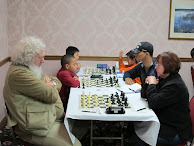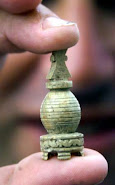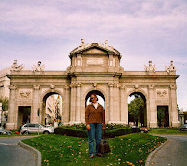 ...and leave it to the looters who don't give a flying fig about the historical significance of their "loot" -- all they care about is how much they can sell it for to a middle-man who, in turn, will sell it to an expediter who, in turn, will sell it to an expediter on the other side of the world who, in turn, will sell it to either a private collector or an unethical antiquities dealer who features "on the side" showings to wealthy individuals and less than ethical museum curators -- all off the books, of course.
Indus Valley’s secrets to remain buried: Insecurity forces archaeologists to abandon excavations
Daily Times.com.pk
June 29, 2009
By Afnan Khan
Archaeology Department official says embassies had been warning the experts to leave, Benazir’s assassination proved final straw
LAHORE: Foreign archaeologists involved in excavation work to explore the Indus Valley Civilisation in Pakistan have left the country due to the war-like situation.
The experts from the US, Europe and UK uncovered the mysteries of the Indus Valley Civilisation for the world during their research spanning decades. The teams, consisting of senior professors Dr Richard H Meadow, Professor JM Kenoyer, Dr Jean-Francois Jarrige and late Prof George F Dales, had conducted extensive research in different parts of Pakistan. A majority of the areas that were a part of the Indus Valley Civilisation became Pakistan after the partition of the sub-continent in 1947.
Sources in the Federal Archaeology Department told Daily Times that the experts were working despite the tense security situation in the region after 9/11, but had to leave the country after the increase in the wave of violence and terrorism, which led to the assassination of former prime minister Benazir Bhutto.
Final departure: “Their embassies were already warning them to be careful while working in the areas like Harappa, Mohenjodaro, Taxila, Mehrgarh and other areas in Pakistan, all of them finally left the country after the assassination of Benazir Bhutto,” an Archaeology Department official told Daily Times.
The Indus Valley Civilisation, dating back to 2,600BC, mainly covered the area that is now Pakistan, with its traces in neighbouring countries like India, Iran, Turkmenistan, Uzbekistan, Tajikistan and China.
However, the sources said, the international experts were still keen on resuming the abandoned research work in the country, despite being worried about the security situation. They said the experts were wondering when, if ever, they would be able to resume their excavation.
The sources said the researcher had now been compelled to focus only on the parts of the Indus Valley Civilisation in the Indian state of Gujarat, especially in the city of Lothal. This has deprived Pakistan of a chance to promote its soft image in the world.
Prof Jonathan Mark Kenoyer, an internationally renowned authority on the Indus Valley, who had been researching in Harappa since 1986, told Daily Times that he spent a key part of his life working on the research work in Pakistan but was left with no other option but to leave the country after the assassination of Bhutto.
Kenoyer said he was likely to visit Pakistan in 2010, in order to resume his high-profile research, but said the return totally depended on the law and order in the country.
Federal Archaeology Department Northern Circle Director Salimul Haq told Daily Times that there was not a single foreigner working on any research or excavation project in the country.
He said the department tried its best to facilitate the researchers, but their own embassies were sceptical about their stay in Pakistan. He said the local archaeologists were trying to take over the research work.
Art historian Prof Dr Ajaz Anwar told Daily Times that local archaeologists lacked the expertise to continue the excavation work, as compared to experts from Harvard, Cambridge, Berkley and other globally acclaimed educational institutions.
Anwar said the foreign explorers had been responsible for the excavations and explorations, and the locals had made almost no contribution.
Anwar said the statue of the fasting Buddha, placed in the Lahore Museum, was damaged during its digging by the locals. He said the locals had stuck the broken arm of the statue with traditional cement, instead of using the appropriate material, despite the fact that it was damaging for the splendid piece of art.
Famous historian Prof Dr Mubarak Ali said the departure of international archaeologists was a great loss for the country and the government should try to convince and facilitate these people to come back to Pakistan.
...and leave it to the looters who don't give a flying fig about the historical significance of their "loot" -- all they care about is how much they can sell it for to a middle-man who, in turn, will sell it to an expediter who, in turn, will sell it to an expediter on the other side of the world who, in turn, will sell it to either a private collector or an unethical antiquities dealer who features "on the side" showings to wealthy individuals and less than ethical museum curators -- all off the books, of course.
Indus Valley’s secrets to remain buried: Insecurity forces archaeologists to abandon excavations
Daily Times.com.pk
June 29, 2009
By Afnan Khan
Archaeology Department official says embassies had been warning the experts to leave, Benazir’s assassination proved final straw
LAHORE: Foreign archaeologists involved in excavation work to explore the Indus Valley Civilisation in Pakistan have left the country due to the war-like situation.
The experts from the US, Europe and UK uncovered the mysteries of the Indus Valley Civilisation for the world during their research spanning decades. The teams, consisting of senior professors Dr Richard H Meadow, Professor JM Kenoyer, Dr Jean-Francois Jarrige and late Prof George F Dales, had conducted extensive research in different parts of Pakistan. A majority of the areas that were a part of the Indus Valley Civilisation became Pakistan after the partition of the sub-continent in 1947.
Sources in the Federal Archaeology Department told Daily Times that the experts were working despite the tense security situation in the region after 9/11, but had to leave the country after the increase in the wave of violence and terrorism, which led to the assassination of former prime minister Benazir Bhutto.
Final departure: “Their embassies were already warning them to be careful while working in the areas like Harappa, Mohenjodaro, Taxila, Mehrgarh and other areas in Pakistan, all of them finally left the country after the assassination of Benazir Bhutto,” an Archaeology Department official told Daily Times.
The Indus Valley Civilisation, dating back to 2,600BC, mainly covered the area that is now Pakistan, with its traces in neighbouring countries like India, Iran, Turkmenistan, Uzbekistan, Tajikistan and China.
However, the sources said, the international experts were still keen on resuming the abandoned research work in the country, despite being worried about the security situation. They said the experts were wondering when, if ever, they would be able to resume their excavation.
The sources said the researcher had now been compelled to focus only on the parts of the Indus Valley Civilisation in the Indian state of Gujarat, especially in the city of Lothal. This has deprived Pakistan of a chance to promote its soft image in the world.
Prof Jonathan Mark Kenoyer, an internationally renowned authority on the Indus Valley, who had been researching in Harappa since 1986, told Daily Times that he spent a key part of his life working on the research work in Pakistan but was left with no other option but to leave the country after the assassination of Bhutto.
Kenoyer said he was likely to visit Pakistan in 2010, in order to resume his high-profile research, but said the return totally depended on the law and order in the country.
Federal Archaeology Department Northern Circle Director Salimul Haq told Daily Times that there was not a single foreigner working on any research or excavation project in the country.
He said the department tried its best to facilitate the researchers, but their own embassies were sceptical about their stay in Pakistan. He said the local archaeologists were trying to take over the research work.
Art historian Prof Dr Ajaz Anwar told Daily Times that local archaeologists lacked the expertise to continue the excavation work, as compared to experts from Harvard, Cambridge, Berkley and other globally acclaimed educational institutions.
Anwar said the foreign explorers had been responsible for the excavations and explorations, and the locals had made almost no contribution.
Anwar said the statue of the fasting Buddha, placed in the Lahore Museum, was damaged during its digging by the locals. He said the locals had stuck the broken arm of the statue with traditional cement, instead of using the appropriate material, despite the fact that it was damaging for the splendid piece of art.
Famous historian Prof Dr Mubarak Ali said the departure of international archaeologists was a great loss for the country and the government should try to convince and facilitate these people to come back to Pakistan.
Monday, June 29, 2009
War Forces Archaeologists to Leave Indus Valley
 ...and leave it to the looters who don't give a flying fig about the historical significance of their "loot" -- all they care about is how much they can sell it for to a middle-man who, in turn, will sell it to an expediter who, in turn, will sell it to an expediter on the other side of the world who, in turn, will sell it to either a private collector or an unethical antiquities dealer who features "on the side" showings to wealthy individuals and less than ethical museum curators -- all off the books, of course.
Indus Valley’s secrets to remain buried: Insecurity forces archaeologists to abandon excavations
Daily Times.com.pk
June 29, 2009
By Afnan Khan
Archaeology Department official says embassies had been warning the experts to leave, Benazir’s assassination proved final straw
LAHORE: Foreign archaeologists involved in excavation work to explore the Indus Valley Civilisation in Pakistan have left the country due to the war-like situation.
The experts from the US, Europe and UK uncovered the mysteries of the Indus Valley Civilisation for the world during their research spanning decades. The teams, consisting of senior professors Dr Richard H Meadow, Professor JM Kenoyer, Dr Jean-Francois Jarrige and late Prof George F Dales, had conducted extensive research in different parts of Pakistan. A majority of the areas that were a part of the Indus Valley Civilisation became Pakistan after the partition of the sub-continent in 1947.
Sources in the Federal Archaeology Department told Daily Times that the experts were working despite the tense security situation in the region after 9/11, but had to leave the country after the increase in the wave of violence and terrorism, which led to the assassination of former prime minister Benazir Bhutto.
Final departure: “Their embassies were already warning them to be careful while working in the areas like Harappa, Mohenjodaro, Taxila, Mehrgarh and other areas in Pakistan, all of them finally left the country after the assassination of Benazir Bhutto,” an Archaeology Department official told Daily Times.
The Indus Valley Civilisation, dating back to 2,600BC, mainly covered the area that is now Pakistan, with its traces in neighbouring countries like India, Iran, Turkmenistan, Uzbekistan, Tajikistan and China.
However, the sources said, the international experts were still keen on resuming the abandoned research work in the country, despite being worried about the security situation. They said the experts were wondering when, if ever, they would be able to resume their excavation.
The sources said the researcher had now been compelled to focus only on the parts of the Indus Valley Civilisation in the Indian state of Gujarat, especially in the city of Lothal. This has deprived Pakistan of a chance to promote its soft image in the world.
Prof Jonathan Mark Kenoyer, an internationally renowned authority on the Indus Valley, who had been researching in Harappa since 1986, told Daily Times that he spent a key part of his life working on the research work in Pakistan but was left with no other option but to leave the country after the assassination of Bhutto.
Kenoyer said he was likely to visit Pakistan in 2010, in order to resume his high-profile research, but said the return totally depended on the law and order in the country.
Federal Archaeology Department Northern Circle Director Salimul Haq told Daily Times that there was not a single foreigner working on any research or excavation project in the country.
He said the department tried its best to facilitate the researchers, but their own embassies were sceptical about their stay in Pakistan. He said the local archaeologists were trying to take over the research work.
Art historian Prof Dr Ajaz Anwar told Daily Times that local archaeologists lacked the expertise to continue the excavation work, as compared to experts from Harvard, Cambridge, Berkley and other globally acclaimed educational institutions.
Anwar said the foreign explorers had been responsible for the excavations and explorations, and the locals had made almost no contribution.
Anwar said the statue of the fasting Buddha, placed in the Lahore Museum, was damaged during its digging by the locals. He said the locals had stuck the broken arm of the statue with traditional cement, instead of using the appropriate material, despite the fact that it was damaging for the splendid piece of art.
Famous historian Prof Dr Mubarak Ali said the departure of international archaeologists was a great loss for the country and the government should try to convince and facilitate these people to come back to Pakistan.
...and leave it to the looters who don't give a flying fig about the historical significance of their "loot" -- all they care about is how much they can sell it for to a middle-man who, in turn, will sell it to an expediter who, in turn, will sell it to an expediter on the other side of the world who, in turn, will sell it to either a private collector or an unethical antiquities dealer who features "on the side" showings to wealthy individuals and less than ethical museum curators -- all off the books, of course.
Indus Valley’s secrets to remain buried: Insecurity forces archaeologists to abandon excavations
Daily Times.com.pk
June 29, 2009
By Afnan Khan
Archaeology Department official says embassies had been warning the experts to leave, Benazir’s assassination proved final straw
LAHORE: Foreign archaeologists involved in excavation work to explore the Indus Valley Civilisation in Pakistan have left the country due to the war-like situation.
The experts from the US, Europe and UK uncovered the mysteries of the Indus Valley Civilisation for the world during their research spanning decades. The teams, consisting of senior professors Dr Richard H Meadow, Professor JM Kenoyer, Dr Jean-Francois Jarrige and late Prof George F Dales, had conducted extensive research in different parts of Pakistan. A majority of the areas that were a part of the Indus Valley Civilisation became Pakistan after the partition of the sub-continent in 1947.
Sources in the Federal Archaeology Department told Daily Times that the experts were working despite the tense security situation in the region after 9/11, but had to leave the country after the increase in the wave of violence and terrorism, which led to the assassination of former prime minister Benazir Bhutto.
Final departure: “Their embassies were already warning them to be careful while working in the areas like Harappa, Mohenjodaro, Taxila, Mehrgarh and other areas in Pakistan, all of them finally left the country after the assassination of Benazir Bhutto,” an Archaeology Department official told Daily Times.
The Indus Valley Civilisation, dating back to 2,600BC, mainly covered the area that is now Pakistan, with its traces in neighbouring countries like India, Iran, Turkmenistan, Uzbekistan, Tajikistan and China.
However, the sources said, the international experts were still keen on resuming the abandoned research work in the country, despite being worried about the security situation. They said the experts were wondering when, if ever, they would be able to resume their excavation.
The sources said the researcher had now been compelled to focus only on the parts of the Indus Valley Civilisation in the Indian state of Gujarat, especially in the city of Lothal. This has deprived Pakistan of a chance to promote its soft image in the world.
Prof Jonathan Mark Kenoyer, an internationally renowned authority on the Indus Valley, who had been researching in Harappa since 1986, told Daily Times that he spent a key part of his life working on the research work in Pakistan but was left with no other option but to leave the country after the assassination of Bhutto.
Kenoyer said he was likely to visit Pakistan in 2010, in order to resume his high-profile research, but said the return totally depended on the law and order in the country.
Federal Archaeology Department Northern Circle Director Salimul Haq told Daily Times that there was not a single foreigner working on any research or excavation project in the country.
He said the department tried its best to facilitate the researchers, but their own embassies were sceptical about their stay in Pakistan. He said the local archaeologists were trying to take over the research work.
Art historian Prof Dr Ajaz Anwar told Daily Times that local archaeologists lacked the expertise to continue the excavation work, as compared to experts from Harvard, Cambridge, Berkley and other globally acclaimed educational institutions.
Anwar said the foreign explorers had been responsible for the excavations and explorations, and the locals had made almost no contribution.
Anwar said the statue of the fasting Buddha, placed in the Lahore Museum, was damaged during its digging by the locals. He said the locals had stuck the broken arm of the statue with traditional cement, instead of using the appropriate material, despite the fact that it was damaging for the splendid piece of art.
Famous historian Prof Dr Mubarak Ali said the departure of international archaeologists was a great loss for the country and the government should try to convince and facilitate these people to come back to Pakistan.
Subscribe to:
Post Comments (Atom)



































No comments:
Post a Comment